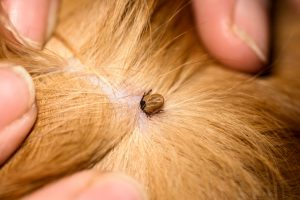Symptoms of Parasites in Dogs

Do Dogs Have Dreams?
December 13, 2022
Lyme Disease in Dogs: Symptoms and What to Do
February 2, 2023Unfortunately, parasitic infections in dogs are more common than some dog owners may think. This is because dogs like to explore places that could potentially be contaminated with parasites such as areas with tall grass, mud puddles, and dirty bodies of water. Additionally, dogs will often eat and drink things that could potentially be carrying intestinal parasites.
The good news is that most of the time, internal parasitic infections in dogs are treatable. This is especially true if the infection is caught in its early stages. Of course, external parasites like fleas, mites, and ticks are very treatable in dogs as well.
In this article, we will be explaining what the symptoms of parasitic infections in dogs are. We will also be explaining how dog owners can prevent their dog from getting a parasitic infection. In addition to this, we will be describing how parasitic infections in dogs are diagnosed and treated by a vet as well.
Intestinal Parasites That Can Infect Dogs
There are several different types of intestinal parasites that could infect dogs. These different intestinal parasites include tapeworms, whipworms, hookworms, roundworms, giardia, and coccidia. Here we will be taking a look at these different types of parasites more closely and explaining how they can affect dogs.
Tapeworms
Tapeworms are an intestinal parasite that require a host to survive. Unfortunately, this means that they can infect dogs. Most of the time, a tapeworm infection in dogs is not life threatening, and only very sick dogs and puppies tend to be at risk of experiencing complications.
Complications that can occur in these cases include malnourishment and dehydration. In addition to this, puppies will usually have stunted growth as well, and very young puppies could be at risk of an intestinal blockage when they have a severe tapeworm infection.
Whipworms
Whipworms are very small worms that live in the large intestine. They will usually cause a dog to lose weight and have a severe case of diarrhea. Considering that severe cases of whipworm infections in dogs can cause severe dehydration and malnourishment, it is best to get your dog seen by a vet as soon as possible if you suspect that they may have a whipworm infection.
Hookworms
Hookworms live in the digestive tract and feed on an animal’s blood. As a result, hookworm infections are often among the more severe of the different kinds of parasitic infections in dogs. This is because hookworm infections commonly cause anemia along with some other potential complications in dogs.
Roundworms
Roundworms commonly cause digestive issues like vomiting and diarrhea in dogs, and in severe cases dogs with a roundworm infection may get pot belly as well. Roundworms are more commonly a serious problem in young puppies. However, adult dogs can also get roundworm infections.
Giardia
Giardia are tiny microscopic organisms that infect a dog’s digestive system. Most of the time, dogs get a Giardia infection by coming into contact with infected feces. Although some dogs with a Giardia infection may be asymptomatic, foul smelling gas, vomiting, and diarrhea are among the most common signs of a Giardia infection in dogs.
Coccidia
Like Giardia, Coccidia are very tiny intestinal parasites that can infect dogs. Most of the time, dogs with a Coccidia infection will have diarrhea and show signs of dehydration. Although Coccidia infections are prevalent in young puppies, adult dogs can also get these infections as well. It is important to note that this condition can be life threatening in dogs, so it is crucial that you take them to the vet as soon as possible if you suspect that your dog may have a Coccidia infection.
Heartworms
Heartworms are a type of internal parasitic infection that is passed by mosquitos. The worms live in a dog’s bloodstream, and the condition can be fatal in late stages.
Symptoms Of Intestinal Parasites In Dogs
Even though there can be some differences in the symptoms from these intestinal parasites, there are some similarities amongst all of them. Here are some of the most common symptoms of intestinal parasitic infections in dogs for dog owners to watch out for:
- Vomiting and diarrhea
- Blood present in stool or vomit
- White splotches, dots, or worms present in stool
- Signs of dehydration
- Signs of anemia
- Reduced appetite or refusal to eat
- Weight loss
- Stunted growth (in puppies)
- Lethargy
If you notice any of the above symptoms in your dog, you should get them into the vet as soon as possible.
External Parasites That Can Infect Dogs
There are external parasites that can infect dogs as well, and these tend to be more common than internal parasites are. External parasites include fleas, mites, and ticks.
Fleas
Fleas are tiny creatures that live on a dog’s skin and bite them, causing the dog to become very itchy and scratch excessively. Usually, fleas in dogs are fairly easy to treat with a specialized shampoo.
Mites
Mites are also tiny creatures that tend to give dogs itchy skin. There are multiple types of mites in dogs, and not all of them are contagious. However, they all cause a condition known as mange.
Ticks
Ticks are among the most common parasites on dogs, and they latch themselves onto a dog’s skin and drink their blood. Although ticks can be easily removed, further complications such as Lyme disease can be a result of frequent or prolonged tick bites.
How Are Parasitic Infections In Dogs Diagnosed?
Most of the time, intestinal parasites are diagnosed through a fecal test, while the effects of external parasites can usually be seen through a physical exam. Diagnosing a heartworm infection usually requires a blood test.
Treating Parasitic Infections in Dogs
Internal parasites are usually treated with a de-wormer medication. This medication kills the worms, leaving your dog parasite free once the treatment is over. External parasites are typically treated with special shampoos and/or physical removal.
How Can You Prevent Dogs From Getting A Parasitic Infection?
Luckily, most parasitic infections are preventable. There are heartworm prevention medications that prevent a heartworm infection, and this sometimes includes protection from intestinal parasites as well. Similarly, flea and tick prevention medication protects dogs from these external parasites.
Conclusion
Although there are a variety of different parasitic infections, they traditionally show similar symptoms. Luckily, most parasites are easy to treat. However, if you notice some of the symptoms listed in this article, your pup should be seen by a veterinarian.
For dog parents in the New Jersey area, Pet Check Urgent Care has locations in Sewell, NJ and Deptford, NJ. Visit us online today!







